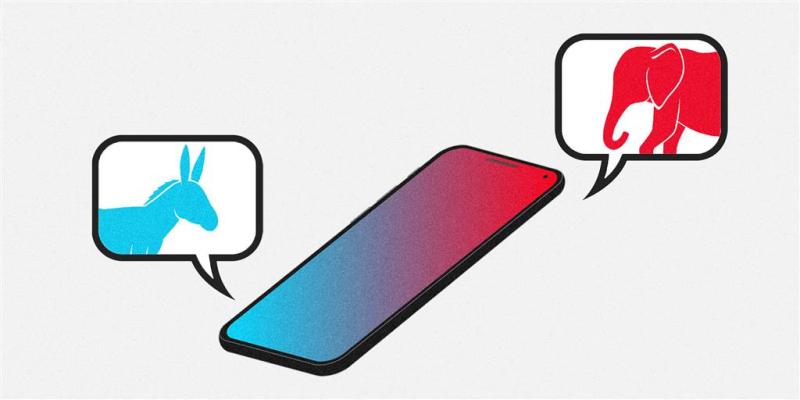Tired of political text messages? A new 'score' might mean fewer



These days, the work of the NAACP often revolves around the text message — specifically, software that lets members of the civil rights group easily send large numbers of texts to other people, including nonmembers.
Last year, when the coronavirus pandemic made other forms of organizing difficult, the NAACP used texting software to encourage 12 million people to vote and many others to fill out their census forms.
But now the NAACP says its texting campaigns and similar efforts by other advocacy groups are under threat from some of the nation's biggest phone carriers including AT&T and T-Mobile.
This month, the wireless companies are beginning to roll out a system that requires organizations running texting campaigns to fill out an application and submit to a "trust score" determined by a vendor's computer algorithm. The companies haven't said how the scores will be calculated, but if a score is too low, an organization would face strict limits on its text messaging.
"This type of program allows for someone behind a curtain to make arbitrary decisions," said Jamal Watkins, the NAACP's senior vice president for strategy and advancement.
The 2020 election campaign saw a flood of text messages, annoying many recipients, including some who said there was no easy way to get the messages to stop. Industry experts said the wireless carriers are grappling with the future of SMS text messaging itself, as more communication moves to data-based apps like WhatsApp.
"It's kind of a relic, like fax machines. There's so much spam. I'm sure they're excited to get rid of it some day," said Sean Heiney, founder and chief operating officer of SignalWire, a tech company that provides some texting services.
The possible crackdown by AT&T and T-Mobile is causing an uproar among progressive organizers who say the system is ripe for abuse. Organizers say the scores will be based on an undisclosed formula without any real possibility for appeal, raising the prospect for algorithmic bias, and that one third-party vendor handling the trust scores has ties to a major donor to former President Donald Trump.
Eighteen groups including the Planned Parenthood Federation of America, the Sierra Club and the NAACP signed a letter to Democratic lawmakers and President Joe Biden this month asking them to intervene. There's been no official response yet.
The timeline for compliance keeps shifting, but under the new system, organizations such as the NAACP will need to fill out detailed questionnaires about not only themselves but also the types of texting campaigns they plan to operate — even though they don't know precisely how they'll use texting in the future.
Overseeing the scoring system will be a new entity, the Campaign Registry, which calls itself a "reputation authority" and is a subsidiary of Kaleyra, a communications company based in Milan. The registry said in a LinkedIn post last year wireless carriers will now have "visibility into the 'who' and 'what' of each messaging campaign" by corporate brands. But its rules will apply not only to businesses that send lots of texts but also to nonprofits that generally lack big marketing departments.
"It's a black box that favors corporations over organizations that are not-for-profit and community-based," Watkins said. He said the NAACP's current texting campaigns would be "untenable" if the registry goes through.
Text-banking has surged in popularity the past three years as a primary way for political campaigns and issue advocates to get their messages out. Volunteers or paid employees can do it from their living rooms, using pre-written language to text strangers, and the messages don't count as bulk spamming because each text is sent individually with a click or a phone tap. Both the Biden and Trump campaigns used the tactic in last year's presidential race.
The move by AT&T and T-Mobile, along with a few smaller wireless carriers, is the industry's latest attempt to regulate the practice before it takes off even more.
"We want all groups and organizations to be able to effectively and reliably communicate with their intended audience via text messaging. Our policies protect our customers from unwanted texts, while ensuring messages they want to receive are delivered," an AT&T spokesperson said in a statement.
Businesses will have to pay a new fee as part of the overhaul, but registered nonprofits, charities and similar groups will be spared, the spokesperson said. She did not respond to follow-up questions.
Once it goes into effect, potentially in June, AT&T would be able to block potentially many more texts going to AT&T customers, and other carriers could do the same for their customers.
A spokesperson for T-Mobile said in a statement that the changes will help to ensure that customers who want to receive text messages will always receive them and will help prevent bad actors from impersonating others.
Verizon, the other large U.S. wireless carrier, is not participating in the Campaign Registry, though it could decide to at a later point. A Verizon spokesperson said he had no information about the decision.
Debra Cleaver, CEO of VoteAmerica, a nonprofit group that registers voters and provides information via text about how to vote, said the program would be devastating for her organization and wouldn't even affect spammers who send fraudulent texts.
"It will leave us with very few to no channels to get time-sensitive information into voters' hands," she said. "We choose text messages because 90 percent of them are read within 3 minutes."
The idea of scoring nonprofits for trust based on an algorithm is moving forward just as researchers and governments are ramping up their scrutiny of decisions that are made automatically by computer. Biased algorithms have been blamed for making discrimination worse in areas such as housing, job searches and criminal penalties.
Trust scores or risk scores are used widely online to filter emails for spam, to stop bots from scamming websites and for other security purposes, though they've been criticized for a lack of transparency.
Nonprofit organizers said they've seen no information about how the wireless carriers and the Campaign Registry will prevent biased outcomes in their trust scores.
"I would have extensive questions about what's going to go into the trust scores," Cleaver said. "Who's going to determine the algorithm? What's going to go into it? What is the process going to be if you want to appeal it?"
She said VoteAmerica is already a federally approved nonpartisan charity for tax purposes and that the carriers should work from that basis. "The idea of the telecommunications companies assigning trust scores to registered nonprofits is laughable given their long history of exploiting and mistreating consumers," she said.
It's unclear how the Campaign Registry is weighing possible bias. A spokesperson for the registry declined to answer questions or make anyone available for an interview, saying the organization was "quite busy."
AT&T and T-Mobile did not respond to questions about the trust score system.
Heiney, of SignalWire, said there may be reason to worry about the industry creating a single gatekeeper for who can organize mass texts.
"We service customers on all sides of the political spectrum," he said. "When you've got to a change where there's a single organization approving stuff, that's probably a fair concern, and hopefully the FCC and other watchdogs are going to look at this to ensure fair messaging."
A spokesperson for the Federal Communications Commission declined to comment.
The NAACP's Watkins said he's especially concerned because one of the private data firms that's a vendor for the project, Aegis Mobile, has long ties to a donor to former President Donald Trump's campaigns. The donor, Jeffrey Goettman, was executive chairman of Aegis, according to a LinkedIn profile, and later served in the Treasury Department under Trump. He is currently working for a Republican candidate for Virginia governor.
"His politics and profile are extremely alarming in this space," Watkins said. "It is not to suggest that conservatives cannot be fair," he added, but to be so aligned with Trump "is deeply troubling."
Neither Aegis nor Goettman responded to requests for comment.
WMC Global, another data firm that's serving as a ratings agency for the project, said on its website that it is scoring entities "within minutes" based on factors such as consumer complaints, fraud cases and "established business practices" to "develop a holistic view of an entity's corporate and stakeholder history and assign a score based on that risk assessment." The company did not respond to a request for an interview.
If a trust score comes out low, an organization can pay more for additional vetting from an approved vendor, but there's no guarantee of a better outcome, SignalWire said in a 3,000-word note to clients to help guide them through the registration process.
Any messages sent by a texting campaign to AT&T customers after June 1 "will be subject to heavy filtering and potential blockage," SignalWire said.



"hi, this is jenna and we've been trying to reach you about your vehicle warranty"
>block<
Too funny because now they give you the option of opting out by choosing "2", they hang up
and keep calling from different phone numbers.
my list of blocked numbers dwarfs my contact list. I'll be continuing with my theory that they will eventually run out of numbers to call from, hopefully before I die. on the plus side, the number that a failed senator in my state was using was kept live for a virtual town hall last year and I texted a profanity filled list of suggestions for the candidate to follow that made it to the screen during his town hall. I didn't see it, but I got a few phone calls from people that did. his campaign opted me out shortly there after.
" ... a "trust score" determined by algorithms."
Um ... algorithms are written by people.